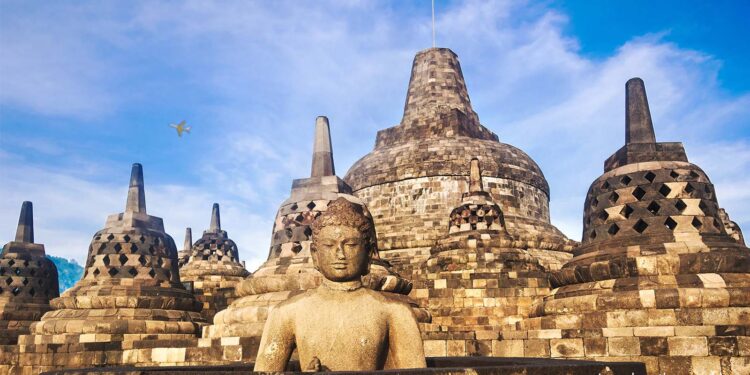BizAv Ops to Jakarta: Picking the Right Airport

Located on the NW coast of the island of Java, Jakarta is one of the most populous cities in SE Asia and a frequent destination for business aircraft. When conducting missions here, the first considerations in choosing an airport should be aircraft parking availability, convenience to the passenger’s destination, and aviation fueling arrangements.
The following is an overview of what you need to know:
1. There are two airport options for Jakarta
Both airports serving Jakarta – Soekarno (WIII) and Halim (WIHH) – are 24 hour airports of entry (AOE) available for general aviation (GA). There are no operating curfews at either airport, and CIQ clearance is available 24/7. No noise restrictions are currently in place at these airports. WIII is about 20 miles from the city center and a one-to-two hour drive depending upon traffic. WIHH is about eight miles away, and drive time is about 30 minutes. There are general aviation terminals located at both airports.
2. WIII has operational and aircraft parking restrictions
Aircraft parking arrangements can be challenging at WIII due to the high volumes of scheduled commercial activity. Overnight aircraft parking for nonscheduled operations is generally not available, and special access for VIP arrivals/departures is not possible at this location. Parking approval is needed to arrange overnight aircraft parking, and this is usually not available for general aviation (GA) flights – with the only option being to drop off/pick up passengers. In most cases, operators needing to remain overnight in the Jakarta area will need to reposition to WIHH. Airport slots are needed for this airport, and these must be requested at least three days prior to operation. Operators are limited to one arrival and one departure slot per day. This applies to aircraft using the same call sign for arrivals and departures, but exceptions can be obtained for GA aircraft when the call sign is the aircraft’s tail number. Once approved, the deviation is +/- 15 minutes. Fueling arrangements must be made in advance for WIII, and there may be potential for delays at this location. Please note that pressure fueling is available at this airport.
3. WIHH is the preferred airport for GA
WIHH is a GA-friendly airport, and scheduled commercial operations do not impact access to this location. The airport is close to the city center with ample aircraft parking available. Overnight and extended stays are usually not a problem at WIHH. Also, pressure fueling is available at this airport.
4. Consider infrastructure and services at each location
Both locations have serviceable tarmac, taxiways, and runways with no upcoming closures scheduled at this time. There are no separate parking areas based on size/weight of aircraft, and all parking stands are on a first-come/first-serve basis. Aircraft will not be relocated, at either airport, without flight crew being present. Note that hangar space for transient operations is not available at either location.
5. Landing permits are required for Indonesia
All aircraft operating to Indonesia must have landing permit, and lead time is five business days. The Civil Aviation Authority (CAA) is diligent in processing permit revisions but only during normal operating hours. Documents needed for a landing permit include airworthiness and registration certificates and worldwide insurance. Note that for any landing in Indonesia, other than a tech stop, you’ll need to provide a local business contact. Also, note that as of October 2015, you may only operate to one airport in Indonesia, with the exception of a customs stop, tech stop, or fuel uplift stop. For more information on permits, please see our article “Indonesia Landing and Overflight Permit Requirements for General Aviation.”
6. ICAO flight plans must be complete
Your ICAO flight plan must be complete, or it will not be accepted in Indonesia. Flight plan information must include captain’s name, emergency equipment onboard, and aircraft coloring/markings. Note that if this information is not included, the pre-file will not be accepted, and the ground handling agent or captain will be called in to refile the flight plan.
7. Know CIQ considerations
Customs clearance is within the main terminal at WIII, and crew/passengers clear customs along with commercial passengers. At WIHH clearance takes place at the FBO, and there’s a lounge available for passengers to wait in. Onboard or planeside CIQ clearance is not possible at either airport. Depending on commercial flight traffic at WIHH, it takes approximately 15-20 minutes to clear customs.
8. Documentation requirements
Crew/passengers must have passports with at least six months remaining validity as well as visas, depending upon crew/passenger nationality. In some cases visas may be obtainable on arrival for crew, but you’ll need to confirm this in advance with your 3rd-party provider. General declarations are required, and your ground handler will prepare these prior to your arrival. To ensure the CIQ clearance process goes smoothly your ground handler needs complete crew/passenger information at least 24 – 48 hours in advance.
9. Be mindful of agricultural and in-flight catering restrictions
As with most international destinations Indonesia has certain restrictions on importation or offloading of certain meats, vegetables, and fruits. Depending upon the food item, and how it’s packaged, you may be permitted to store onboard catering at the FBO during your stop in Jakarta. It’s best, however, to always check any specific requirements with your ground handler in advance.
10. In-flight catering considerations
WIII has an on-site in-flight caterer, but none is available on-site at WIHH. Your ground handler can assist in catering arrangements/coordination at either location with an in-flight caterer or from a local hotel or restaurant. Best policy is to plan on 24 – 48 hours advance notification to ensure all catering requests are sourced and secured.
11. Airport security is adequate
International airports in Indonesia are secure. For this reason, airport authorities do not permit operators to arrange privately-sourced outside security for the aircraft. It’s recommended, however, that operators consider obtaining airport security briefs to gain more insight into security processes at particular airports. Personnel security is not usually recommended for crew/passengers in the Jakarta area, but this will depend upon crew/passenger needs.
12. Consider ground transportation and hotel availability
It’s recommended that operators use pre-paid transportation (car and driver) for local crew transport. Rental vehicles can be arranged by your ground handler at both Jakarta airports; however, this option is not recommended unless you’re familiar with the area. Best practice is to avoid public taxis that have not been pre-vetted by either your ground handler or hotel.
A wide selection of 4- and 5-star hotels is available for crew accommodation in the Jakarta area. While there are some good hotels located near the airports most crews opt to stay in the city.
Conclusion
When traveling to Jakarta ensure that you allow appropriate time for landing permit and aircraft parking arrangements. For WIIII operations be mindful that overnight parking will most likely not be an option. Between the two available Jakarta airports WIHH is the preferred choice for most corporate operators.
Questions?
If you have any questions about this article or have further questions about operations to Jakarta, contact me at johnperry@univ-wea.com.




